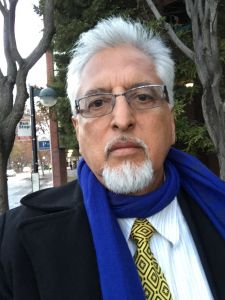
A view of a Chevron refinery on March 3, 2015 in Richmond, California. (Photo by Justin Sullivan/Getty Images)
In a year of politics by extremes — trash-talking candidates, journalism by celebrity- and scandal-mongering, voter anger on the left and right — there are antidotes. One of them is a courtly, retired schoolteacher serving his first term as an elected official in a West Coast city of middling size and less-than middling means.
Eduardo Martinez, is a member of the city council in Richmond, California, a city that regular visitors to BillMoyers.com may remember. As Democracy Spring and Democracy Awakening activists gather this week in Washington, DC, to demand new restrictions on big political donations and an end to restrictions on ballot access, the story is an apt one.
On paper, Richmond seems an unlikely showcase for civic empowerment. A town just shy of 109,000 residents, it’s only 18 miles north of San Francisco, but economically a world away. In San Francisco, the median household income is $83,000 a year. In Richmond, it’s $55,000. Nearly 18 percent of Richmond residents live below the poverty line; half of the population speaks a language other than English at home, according to federal data compiled by the Census Reporter project.
Two years ago, Martinez and a slate of allied candidates put Richmond on the map when they won a majority on the City Council despite a better-than $3 million campaign to defeat them by Chevron. The oil giant owns a refinery in town and the city council reformers are pressing a lawsuit over a 2012 fire that resulted in 15,000 residents needing medical treatment after inhaling toxic fumes. A federal report blamed Chevron for safety violations, but Martinez and his allies don’t think they’ve learned enough about their corporate neighbor’s operations.
“If it goes to trial, a lot of information will have to be made public,” he said of the city’s lawsuit. “We’re focused on making sure it goes to trial.”
More recently, the city has been making news, nationally and globally, for its innovative program to keep its young people out of jail and to keep those who have been there already from returning. It’s a program that, Martinez says, his reform coalition backed.
How a bunch of underfinanced Davids in an unprepossessing burg managed to accomplish what all of this year’s free-floating radicals would like to do — take the local elites down a peg — seems a story worth examining more closely. So when I heard Martinez speak last month at a Common Cause “Blueprint for a Great Democracy” gathering, I sought him out to hear more.
It’s a long story. Not so much in the telling as in the doing. Yes, for Martinez, it started with a protest march. But it’s also a story of patience, perseverance and success that was born of failure.
Up until two years ago, Martinez was what Donald Trump might characterize as a loser. He had lost two city council races, in 2010 badly and then again, by 512 votes, in 2012. That came after retiring from a career working as a public servant, making union wages and working in less-than-Mar-a-Lago splendor.
His first brush with political activism, Martinez told me, came “like instantaneous combustion” after he happened to read a story in the local paper about how funds were being set aside to improve the auditorium of the local high school. Problem was, the money was being diverted from his elementary school, in a browner, poorer part of town. Every time it rained, the building where Martinez taught got flooded. “My kids had to walk through sewer water to get to the classrooms,” he said. He organized parents and fellow teachers and got the money back. That was more than a decade ago.
At about the same time he was getting his start as a hell-raiser (Martinez and several colleagues later won a University of Arizona award for objecting to a curriculum that required them to teach to test), the Richmond Progressive Alliance was being established to tackle the town’s political problems. Back when the group got started, Martinez told his audience at Common Cause, Chevron was so entrenched in city government that the company had its own office in City Hall. “Chevron actually owned the City Council,” he said. They would continue to do so for more than a decade.
The reformers were undaunted, and that’s why, Martinez said, they eventually won. After better than 10 long years.
The 2014 election that gave the anti-Chevron alliance a majority on the City Council “would not have been possible if not for the work we started in 2003,” he said. Winning control of the town involved years of painstaking grunt work. One key, Martinez said, was countering Chevron’s tactic of packing municipal boards with officials who would rule in the company’s favor on important matters like taxes and zoning. “We made sure there were people at every hearing so the commissioners knew they would be watched and held accountable,” he said.
Which brings us to another key element in the Richmond story. The kind of surveillance Martinez describes used to be done by local newspapers, increasingly an endangered species. In fact, Chevron generously filled the gap by started its own Richmond news services in town: a website that’s overtly backed by the company and another that’s been linked to it.
“They report on a lot of really important things,” said Harriet Blair Rowan. But she added: “There are certain areas they’re never going to report on.”
Rowan, who was a guest on Moyers & Company in 2014, should know. She worked for a competing publication, Richmond Confidential, a website other generous (though arguably more disinterested) benefactors — the Ford Foundation and the University of California at Berkeley’s School of Journalism, where Rowan is now a month away from obtaining her master’s degree.
It was Rowan’s reporting that revealed Chevron’s role in the multimillion-dollar campaign against the Richmond Progressive Alliance, particularly Martinez. As the team’s non-incumbent, he was the candidate Chevron had the most hope of knocking off, Rowan said.
— Harriet Blair Rowan
Martinez thinks he won because of “personal relationships.” After retiring from school teaching, “I started volunteering.” He worked on projects in different parts of his city: helping to set up a music festival and a green festival. He planted fruit and olive trees for an urban gardening project. Martinez also thinks he won because he first lost. “The first time I ran, I actually didn’t do well,” he recalled. Two years later, he lost a city council election by just 512 votes. He blames himself for not knocking on more doors. In 2014, he didn’t make that mistake.
“Democracy is a process,” Martinez said. “You have your ups and downs.”
Now Richmond’s vice mayor, Martinez hopes there will be a “ripple effect” from what happened in his town. “We’ve had political committees in other cities call us for advice,” he said.
Rowan, the journalist who brought the Chevron campaign spending to light, hopes for a ripple effect too. “It’s easy to think of local reporting as not important,” she said. Richmond, however, provides “a perfect example of how important it is for a community to have real news.”
“There’s a lot of forces who don’t want people to know what’s really going on,” Rowan adds. But if they do, this soon-to-graduate journalism master’s student learned: “It’s not always the person with the most money who’s going to win.”
Now that’s a blueprint for a great democracy.
Watch Bill Moyers’s 2014 interview with Richmond Mayor Gayle McLaughlin and reporter Harriet Blair Rowan.






